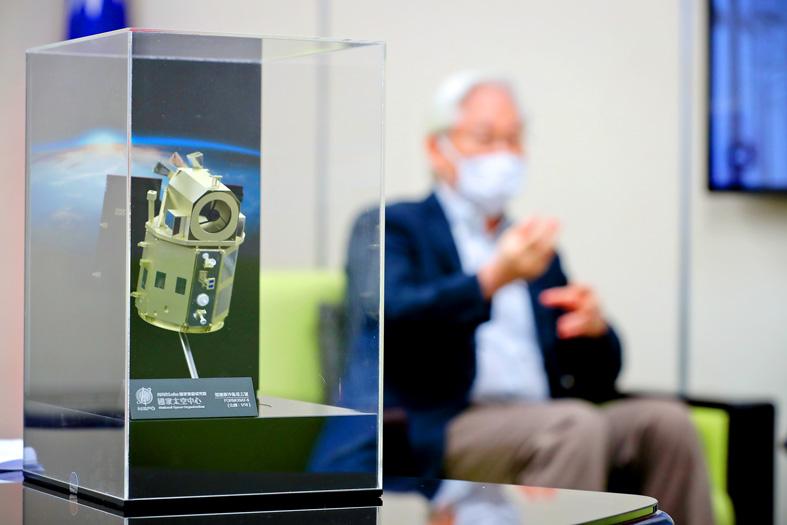Taiwan is stepping up its efforts to tap into the global aerospace market, with a focus on developing a specific kind of satellite, Minister of Science and Technology Wu Tsung-tsong (吳政忠) said on July 6.
The development of low Earth orbit (LEO) satellites are particularly worth pursuing for Taiwan, Wu said in an interview with the Central News Agency, referring to orbits with a maximum altitude of 2,000km.
“It is an opportunity Taiwan definitely cannot afford to miss,” Wu said.

Photo: CNA
Such satellites, which are often deployed in constellations, have a relatively short life cycle of two to four years compared with larger ones and therefore offer more of an opportunity for Taiwanese businesses, he said.
LEO satellites are crucial to the development of the Internet of Things (IoT), which has been pursued by global technology and communications heavyweights such as SpaceX, Amazon and OneWeb, he said.
LEO communications satellites, which are relatively inexpensive, can be launched in large enough numbers to economically provide sufficient bandwidth for data transmission rates that IoT applications require, he said.
This means that there is a high-demand sector that no longer relies on highly advanced technology only affordable to superpowers, Wu said, adding that the sector has a relatively low market threshold that countries like Taiwan can explore.
Taiwan hopes to one day manufacture its own LEO satellites, he said.
The government this year launched a four-year, NT$4 billion (US$142.83 million) project with the aim of launching its first LEO communications satellite in 2025.
In the meantime, Taiwan can capitalize on its years of experience as an original equipment manufacturer to become part of the LEO satellite supply chain, National Space Organization Acting Director-General Yu Shiann-jeng (余憲政) said.
About a dozen Taiwanese companies — including Microelectronics Technology Inc, Win Semiconductors and Kinpo Electronics — are providing components and ground-based reception equipment for SpaceX, Yu said.
With maturer technology and more experience, Taiwanese firms could extend their reach to provide more comprehensive modules with greater added value, he said.
Also expected to help is the Space Development Promotion Act (太空發展法), which was promulgated at the end of May.
The act, which regulates the nation’s space-based activities, shows the world Taiwan’s ambition to carve out its own niche in the space economy, Wu said.
It covers four areas — setting principles of development that are aligned with international space laws, regulating space-based activities to ensure safety, establishing rocket launch sites and promoting industrial development, Wu said.
The ministry is designated as the regulator of the sector and will establish a dedicated agency to deal with related affairs, he said.

Chinese Nationalist Party (KMT) Chairman Eric Chu (朱立倫), spokeswoman Yang Chih-yu (楊智伃) and Legislator Hsieh Lung-chieh (謝龍介) would be summoned by police for questioning for leading an illegal assembly on Thursday evening last week, Minister of the Interior Liu Shyh-fang (劉世芳) said today. The three KMT officials led an assembly outside the Taipei City Prosecutors’ Office, a restricted area where public assembly is not allowed, protesting the questioning of several KMT staff and searches of KMT headquarters and offices in a recall petition forgery case. Chu, Yang and Hsieh are all suspected of contravening the Assembly and Parade Act (集會遊行法) by holding

PRAISE: Japanese visitor Takashi Kubota said the Taiwanese temple architecture images showcased in the AI Art Gallery were the most impressive displays he saw Taiwan does not have an official pavilion at the World Expo in Osaka, Japan, because of its diplomatic predicament, but the government-backed Tech World pavilion is drawing interest with its unique recreations of works by Taiwanese artists. The pavilion features an artificial intelligence (AI)-based art gallery showcasing works of famous Taiwanese artists from the Japanese colonial period using innovative technologies. Among its main simulated displays are Eastern gouache paintings by Chen Chin (陳進), Lin Yu-shan (林玉山) and Kuo Hsueh-hu (郭雪湖), who were the three young Taiwanese painters selected for the East Asian Painting exhibition in 1927. Gouache is a water-based

Taiwan would welcome the return of Honduras as a diplomatic ally if its next president decides to make such a move, Minister of Foreign Affairs Lin Chia-lung (林佳龍) said yesterday. “Of course, we would welcome Honduras if they want to restore diplomatic ties with Taiwan after their elections,” Lin said at a meeting of the legislature’s Foreign Affairs and National Defense Committee, when asked to comment on statements made by two of the three Honduran presidential candidates during the presidential campaign in the Central American country. Taiwan is paying close attention to the region as a whole in the wake of a

OFF-TARGET: More than 30,000 participants were expected to take part in the Games next month, but only 6,550 foreign and 19,400 Taiwanese athletes have registered Taipei city councilors yesterday blasted the organizers of next month’s World Masters Games over sudden timetable and venue changes, which they said have caused thousands of participants to back out of the international sporting event, among other organizational issues. They also cited visa delays and political interference by China as reasons many foreign athletes are requesting refunds for the event, to be held from May 17 to 30. Jointly organized by the Taipei and New Taipei City governments, the games have been rocked by numerous controversies since preparations began in 2020. Taipei City Councilor Lin Yen-feng (林延鳳) said yesterday that new measures by